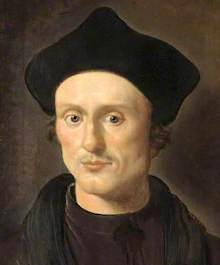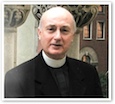In His humanity He did a human thing
- FATHER GEORGE W. RUTLER
The English priest John Colet was influenced by his friends Erasmus and Saint Thomas More.
 John Colet
John Colet1467-1519
As Dean of Saint Paul's Cathedral in London, he founded Saint Paul's School for boys in 1509 on humanist principles. Graduates have included John Milton, Samuel Pepys, John Churchill, G.K. Chesterton, three recipients of the Victoria Cross and Field Marshal Bernard Montgomery, who planned the D-Day invasion in one of its classrooms. Colet provided that the school have 153 young scholars, in recollection of the 153 fish that the disciples hauled ashore the third time the Risen Lord appeared to them.
There is endless speculation about what 153 means, but saints including Jerome and Louis de Montfort have been transfixed in observing that the Tetragrammaton, the unutterable name of God, appears 153 times in the first book of the Bible.
It would be a mistake to suppose that the apostles went back to fishing in disobedience to the Master's command years before that they drop their nets and follow him. Christ is the Alpha and Omega, meaning that He is able to know everything from start to finish at the same time. So He was able to "set up" His men, ordering them to go to the Sea of Tiberius, knowing their thoughts in order to instruct them.
In His humanity He did a human thing in cooking breakfast. In His divinity He predicted what the apostles would become. By an intricate symmetry, He prepared a charcoal fire on the shore and asked Peter three times if he loved Him. Peter got the message, and he wept because he had denied knowing Christ three times sitting by another charcoal fire. Whatever else may have been encoded in the number 153, the point is that this event happened, a detail never to be forgotten.
Contemplation of the unity of the True God and True Man encounters layers of reality beyond the limitations of human intelligence. Nonetheless, we can perceive the existence of those dimensions. A "Participatory Anthropic Principle" among some quantum physicists suggests that the universe is structured with a set of physical constants without which there would be no intelligent life on Earth, and that it is only by participating in that structure by observation that humans can sense this. So there may be in those 153 fish the Voice saying: "I have yet many things to say to you, but you cannot bear them now" (John 16:12).
But one thing we know, and it is what prevents miniaturizing Christ as the best of men, but nothing but a man: "For in Him all things were created, things in heaven and on earth, visible and invisible, whether thrones or dominions, or rulers or authorities. All things were created through Him and for Him. He is before all things, and in Him all things hold together" (Colossians 1:16-17).
 This is Meaghen Gonzalez, Editor of CERC. I hope you appreciated this piece. We curate these articles especially for believers like you.
This is Meaghen Gonzalez, Editor of CERC. I hope you appreciated this piece. We curate these articles especially for believers like you.
Please show your appreciation by making a $3 donation. CERC is entirely reader supported.

Acknowledgement
 Father George W. Rutler. "In His humanity He did a human thing." From the Pastor (May 12, 2019).
Father George W. Rutler. "In His humanity He did a human thing." From the Pastor (May 12, 2019).
Reprinted with permission from Father George W. Rutler.
The Author
 Father George W. Rutler is the pastor of St. Michael's church in New York City. He has written many books, including: The Wit and Wisdom of Father George Rutler, The Stories of Hymns, Hints of Heaven: The Parables of Christ and What They Mean for You, Principalities and Powers: Spiritual Combat 1942-1943, Cloud of Witnesses — Dead People I Knew When They Were Alive, Coincidentally: Unserious Reflections on Trivial Connections, A Crisis of Saints: Essays on People and Principles, Brightest and Best, and Adam Danced: The Cross and the Seven Deadly Sins.
Father George W. Rutler is the pastor of St. Michael's church in New York City. He has written many books, including: The Wit and Wisdom of Father George Rutler, The Stories of Hymns, Hints of Heaven: The Parables of Christ and What They Mean for You, Principalities and Powers: Spiritual Combat 1942-1943, Cloud of Witnesses — Dead People I Knew When They Were Alive, Coincidentally: Unserious Reflections on Trivial Connections, A Crisis of Saints: Essays on People and Principles, Brightest and Best, and Adam Danced: The Cross and the Seven Deadly Sins.




